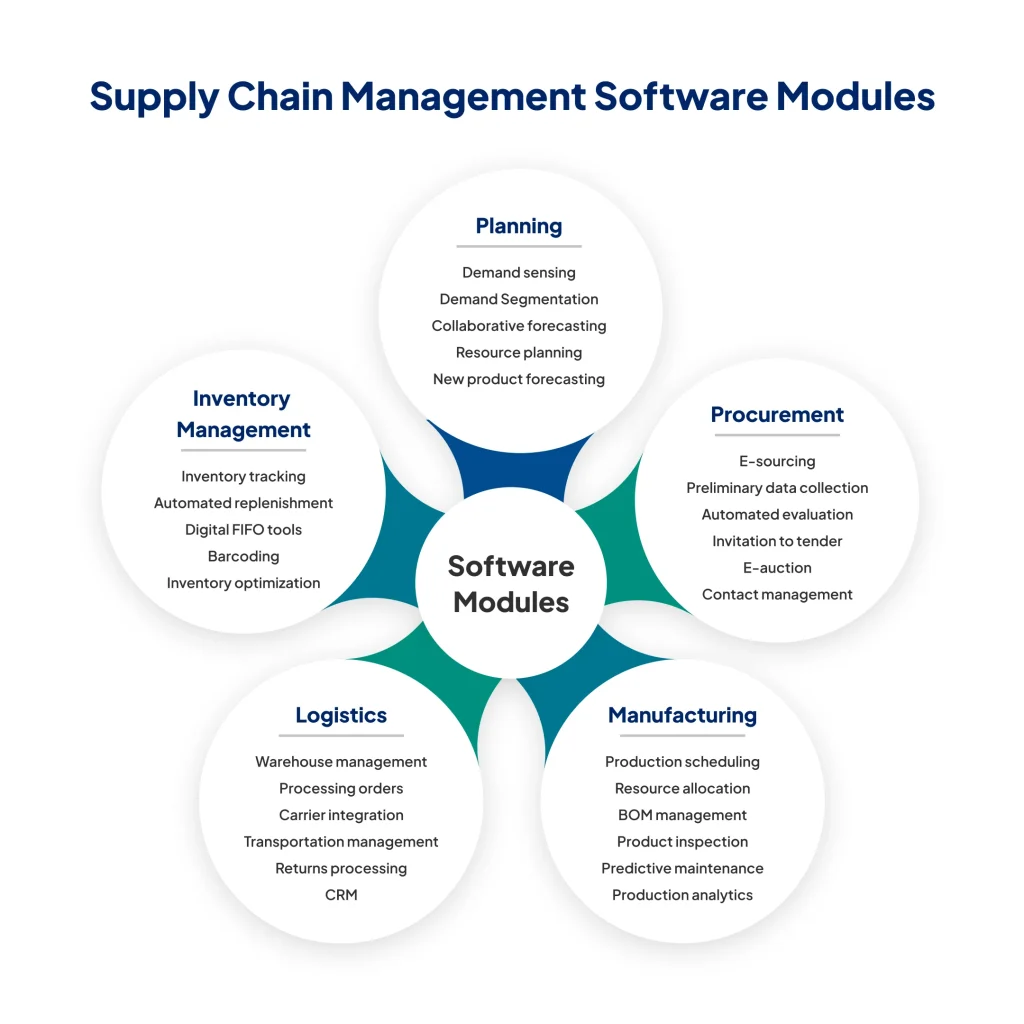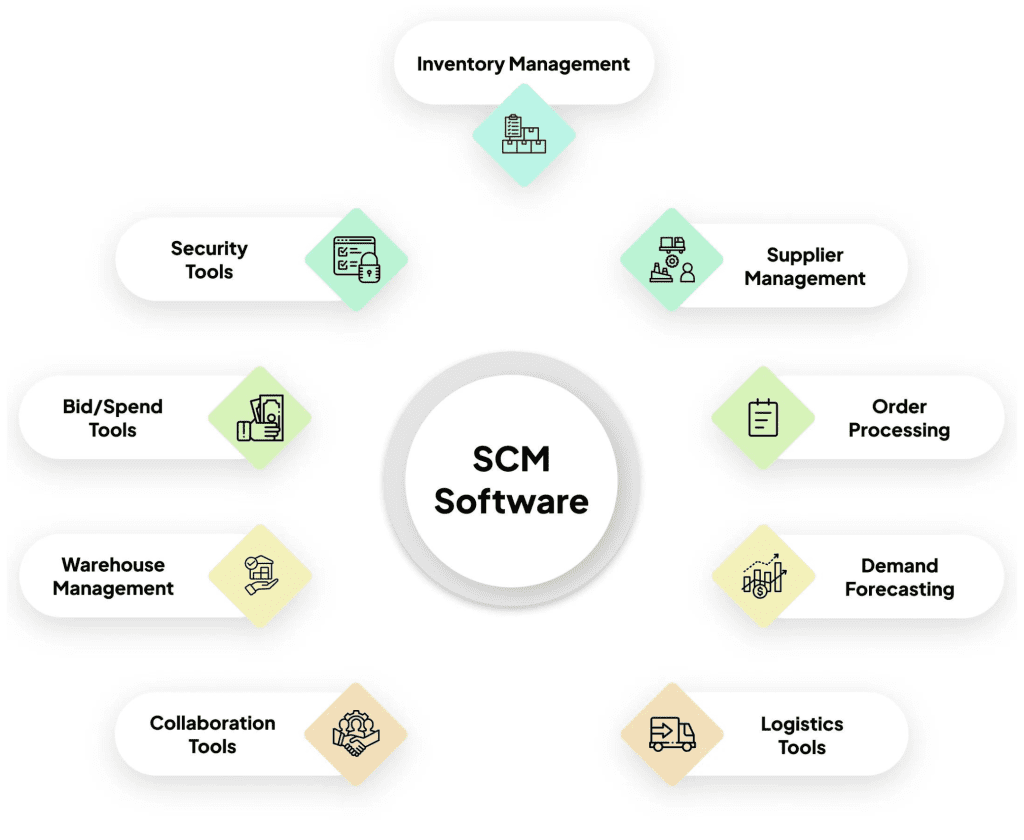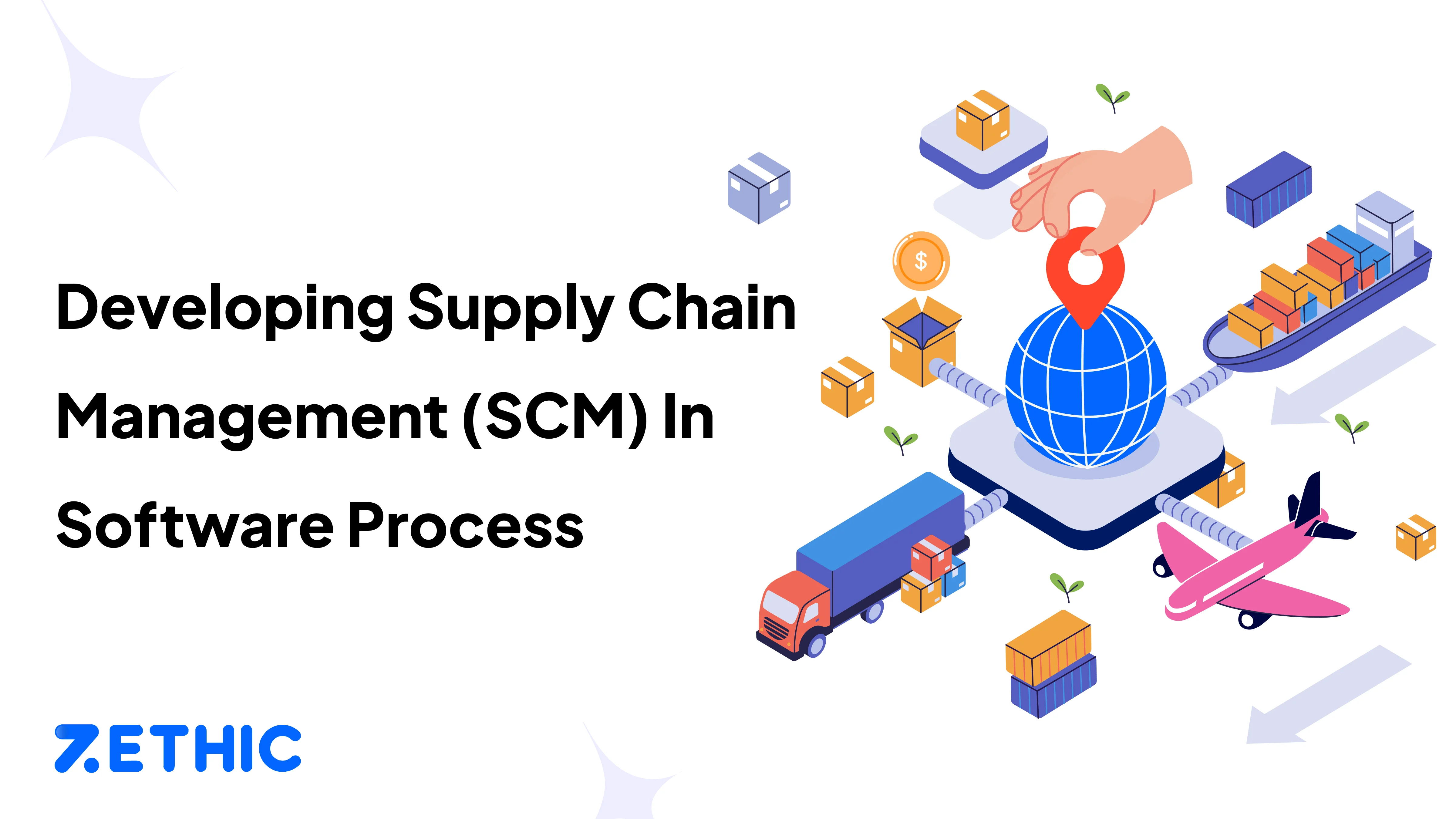Table of Contents
In our fast-paced and technology-driven world, supply chain management software development has revolutionized process optimization, encouraged collaboration, and streamlined data flow. This shift highlights the critical role that SCM plays in software development.
Software development is a solution for supply chain software implementation and management, designed to facilitate activities throughout the software development lifecycle. It ensures efficient data, code, and digital assets flow across different stages. SCM assigns specific roles to supply chain managers and operations managers, who work together to enhance the efficiency of software supply chains. They function like well-oiled machines, ensuring everything runs smoothly.
Understanding supply chain software development is like discovering the secret recipe for a successful dish. In this journey, we will explore the remarkable impact of SCM in the digital realm, where technology and management principles unite for a brighter future.
Join us to explore the exciting world of integrated supply chain management software development.
Integrated Supply Chain Management Software Development Operations
Digital Transformation in Supply Chain Management System
The digital revolution redefines the supply chain, enhancing efficiency and transparency. Automation and data insights drive this shift, allowing organizations to make informed decisions and adapt to market dynamics. Supply chain management software development allows digitizing supply chain management to streamline operations, reduce errors, and improve communication.

Planning
Digital tools empower precise demand forecasting, optimizing production schedules, and enhancing adaptability to market fluctuations. Collaboration platforms foster synergy within planning teams.
Procurement
Digital solutions automate vendor management, procurement, and order processing, simplifying the procurement cycle. E-procurement platforms offer insights into supplier performance and cost-saving opportunities.
Manufacturing
Digital technologies like IoT and robotics optimize production, improving efficiency and quality control. Real-time quality control minimizes defects and waste, while cloud-based systems enhance agility.
Distribution & logistics
Digital logistics platforms reduce transportation costs and improve delivery timelines by optimizing routing and scheduling. Real-time tracking and data analytics aid in inventory control.
Inventory Management
Digital systems track inventory levels in real-time, minimizing carrying costs and stockouts. Predictive tools and automated replenishment systems optimize stock levels.
Analytics
Data analytics tools identify trends, offer insights, and support data-driven decision-making within supply chain operations. Predictive analytics anticipate demand fluctuations and disruptions, while advanced techniques like AI enhance performance by recognizing patterns and making proactive recommendations.
Read More : Step-By-Step Software Development: 7 Phases to Build a Product
What is SCM (Supply Chain Management)?
In the complex and interconnected world of modern business, Supply Chain Management (SCM) systems have emerged as essential tools for organizations seeking to enhance their operational efficiency, reduce costs, and maintain a competitive edge.
What Is SAP SCM?
SAP SCM is a leading supply chain management software solution, providing a robust suite of tools for planning, monitoring, and optimizing operations. It offers real-time visibility, demand forecasting, and agile decision-making, enabling businesses to respond adeptly to market shifts.
Supply Chain Management in the Software Industry
Supply chain management in the software industry is uniquely designed to handle the complexities of digital product development. SCM for software involves coordinating the flow of code, data, and digital assets through each stage of the development lifecycle. By leveraging advanced SCM practices, companies can streamline workflows, improve collaboration across teams, and reduce time to market for digital solutions. This specialized SCM approach enables software companies to better manage resources, optimize development cycles, and ensure seamless delivery of software products.
Top Supply Chain Management Software Vendors
Oracle SCM
Oracle SCM offers robust end-to-end solutions for everyone who wants to build software in supply chain management. It equips organizations with tools for procurement, inventory management, production planning, and logistics, promoting supply chain agility. The real-time data access and advanced analytics capabilities enhance decision-making across the supply chain.
Blue Yonder’s Luminate Platform
Blue Yonder’s Luminate Platform harnesses the power of artificial intelligence and machine learning to transform supply chains into more predictive, responsive, and profitable entities. Its capabilities include demand planning, inventory optimization, and intelligent order fulfillment, offering businesses the agility and adaptability needed in today’s competitive market.
Logility Digital Supply Chain Platform
Logility Digital Supply Chain Platform focuses on end-to-end visibility and collaborative decision-making. With integrated solutions for demand forecasting, inventory optimization, and advanced analytics, it aids businesses in aligning their supply chain strategies with customer expectations, thus reducing costs and enhancing customer satisfaction.
Niche SCM Solutions for Specific Workflows
Beyond the comprehensive systems offered by industry giants, niche SCM solutions cater to specific workflows and industries. These tailored solutions address unique supply chain requirements, allowing businesses to manage their particular needs in pharmaceuticals, fashion, or other specialized sectors.
How to Choose and Implement Supply Chain Management Software
Developing supply chain management (SCM) software is a complex yet rewarding endeavor that requires careful planning, technological expertise, and a deep understanding of the supply chain landscape. Below is a comprehensive guide to creating supply chain management software:
Step 1. Understand the Supply Chain Ecosystem
Before diving into development, study the entire supply chain lifecycle, from procurement and production to distribution and logistics. Identify pain points businesses face, such as inefficient inventory tracking, communication breakdowns, or lack of real-time data.
Step 2. Define the Software’s Purpose and Features
Specify the core objectives of the SCM software. Common features include:
- Inventory Management: Real-time tracking and optimization of stock levels.
- Order Processing: Streamlining order fulfillment and tracking.
- Demand Forecasting: Using predictive analytics to anticipate market needs.
- Supplier and Vendor Management: Maintaining effective communication and performance tracking.
- Logistics and Distribution: Optimizing routes, monitoring shipments, and managing warehousing.
- Analytics and Reporting: Providing actionable insights for data-driven decisions.
Step 3. Select the Right Technology Stack
Choose a robust technology stack based on scalability, speed, and security requirements:
- Frontend Development: React.js, Angular, or Vue.js for user interfaces.
- Backend Development: Node.js, Python (Django/Flask), or Java (Spring).
- Database: MySQL, PostgreSQL, or MongoDB for data storage.
- Cloud Infrastructure: AWS, Azure, or Google Cloud for scalability and remote accessibility.
- Integration Tools: APIs for integrating with existing enterprise software like ERP or CRM systems.
Step 4. Design the User Interface (UI)
Create an intuitive and user-friendly interface. The UI should simplify complex operations, ensuring users can navigate effortlessly through dashboards, reports, and features. Use wireframing and prototyping tools to finalize designs before coding.
Step 5. Develop Core Modules
Focus on building modular software to enhance flexibility and future upgrades:
- Start with a Minimum Viable Product (MVP) to test the basic features.
- Incorporate agile development practices to iteratively add functionalities.
- Ensure interoperability with other software platforms and tools.
Step 6. Ensure Security and Compliance
SCM software deals with sensitive business data. Implement security measures like encryption, multi-factor authentication, and role-based access controls. Ensure compliance with industry standards such as ISO 27001 or GDPR if applicable.
Step 7. Test the Software Thoroughly
Conduct rigorous testing at every stage:
- Unit Testing: Validate individual components.
- Integration Testing: Ensure modules work seamlessly together.
- Load Testing: Assess performance under peak usage.
- User Testing: Gather feedback from actual users to refine the software.
Step 8. Deploy and Maintain the Software
Deploy the software on the chosen platform (cloud or on-premise) and monitor its performance. Offer ongoing support for bug fixes, updates, and enhancements to adapt to evolving business needs.
Step 9. Provide Training and Documentation
Create comprehensive user manuals and offer training sessions to ensure users maximize the software’s potential.
By following these steps, you can build SCM software that enhances operational efficiency, reduces costs, and improves decision-making for businesses across industries.
Factors To Consider When Choosing Supply Chain Management Software
You must be specific when selecting the right supply chain management software as a business owner. Here are some top factors to consider when building robust supply chain management software.
- Compatibility & integration with existing systems in supply chain management.
- Scalability to adapt to your company’s growth.
- Usability & training for supply chain management software.
- Cost & licensing align with your budget for software in supply chain management.
- Analytics & reporting capabilities of supply chain management in software engineering.
- The vendor provides support & updates.
- Industry adaptability of the software in supply chain management.
- Security & data protection for safeguarding sensitive information in the supply chain.
The Implementation Process of Supply Chain Management Software
Zethic simplifies the supply chain management software implementation process by offering expert guidance. Our team collaborates closely with your business to ensure a smooth transition, minimizing disruptions. We provide hands-on support, customization, and training to make adopting SCM software seamless.
Tailoring Supply Chain Software Development Services To Your Business Needs
Zethic understands that one size does not fit all in supply chain management. We excel at tailoring supply chain software development solutions to your business requirements.
Our approach involves:
- An in-depth analysis of your operations.
- Resulting in customized software configurations that optimize efficiency and performance.
- Ultimately saving time and resources.
Types Of Supply Chain Management Software

1. Order Processing In Supply Chain Management
Order processing in supply chain management focuses on streamlining and expediting order-related activities. Efficiency in this domain is vital, as the speed of order processing directly influences client satisfaction and overall revenue. Organizations often opt for automation tools to enhance efficiency, and a robust solution should encompass the following:
- Order fulfillment processing
- Order tracking
- Automated billing
- Paperless purchase order (PO) and invoice generation
Automation in these supply chain aspects empowers your workforce to concentrate on value-added tasks, reducing the burden of repetitive paperwork and lowering the risk of human errors.
2. Truck Dispatching
Trucking dispatch software is a game-changer for supply chain firms. It takes the complexity out of truck routing, keeps an eye on the health of delivery vehicles, and makes scheduling a breeze. If you are constantly communicating with stakeholders, dealing with tricky routes, or racking up empty miles, this software is your solution.
3. Scheduling
Cloud-based scheduling SCM software takes the hassle out of employee scheduling, time tracking, and communication. It’s your go-to for preventing payroll blunders, boosting staff morale, and minimizing scheduling conflicts. Look for features like online schedule management, automated timesheets, leave tracking, and even handy instant messaging.
4. Inventory Management
Inventory management software is a warehouse wizard. It optimizes space, makes production planning a breeze, and can even predict demand to keep those dreaded under-stocks at bay. With the help of AI, it can cleverly group products to simplify logistics, making shipments that need to leave around the same time easier to manage.
5. Shipment Monitoring
In the world of supply chains, keeping track of countless shipments worldwide is a daily challenge. It’s about informing senders and recipients and swiftly resolving any issues that might arise. This is where shipment tracking tools come in. They provide real-time alerts, updates, and GPS locations throughout delivery. These tools offer complete visibility across your distribution network, making operations smoother. Suppose you embrace IoT technology and use intelligent sensors in your cargo or trucks. In that case, you can even monitor the conditions of your products during transit, ensuring they arrive in top-notch condition.
Read More : Unleashing the IoT Revolution: Empowering Future with IoT Software Development Services
6. Demand Forecasting
Demand forecasting tools are a crucial part of supply chain management. They predict future demand, helping with inventory management and labor planning. Modern versions of these tools use machine learning algorithms to make highly accurate predictions, considering historical data and real-time market information.
7. Business Intelligence
Every industry benefits from thorough data analysis, and the supply chain is no different. Business intelligence tools help organizations assess overall performance, measure the success of sales and marketing strategies, and pinpoint sources of delays or errors. These tools are essential for continuous improvement, growth, and increased revenue in the supply chain industry.
8. Customer and Supplier Management
Nurturing relationships with both customers and suppliers is essential in the supply chain. They are the lifeblood of your business. To streamline this, consider using CRM platforms that centralize all information related to your customers and suppliers. Armed with this data, you can launch campaigns to retain customers and maximize revenue, ultimately enhancing your organizational performance.
9. Client Support
When customers rely on your company for deliveries, offering them a channel to reach out in case of issues is crucial. You can enable customer support chat functions on your website and mobile app or operate a contact center with representatives ready to address queries. Some businesses enhance their contact centers with artificial intelligence, benefiting from automated call transcription, real-time analytics, and on-call prompts to ensure swift issue resolution and minimal impact on customer satisfaction.
10. Collaboration
Effective communication is the backbone of a smoothly functioning supply chain business, with numerous stakeholders throughout the value chain. For discussions on order matters, resolving bottlenecks, negotiating new contracts, or managing tasks, turn to project management solutions and chatbot software to ensure seamless collaboration and task completion.
Read More : Chatbot Development: The Rise of Emotionally-Intelligent Virtual Assistants
Implementing The Right Supply Chain Management Software For Your Needs
When managing your supply chain, picking the right software is like choosing the heart of your operation. It can significantly impact how smoothly your business runs. So, the first step is to dig into your unique supply chain needs. Understand your pain points and figure out where technology can make a difference.
Once you’ve got a handle on your needs, the next step is matching the right software to those specific needs. It could be anything from order processing to keeping an eye on your inventory or predicting future demand. The key is to find the tools that perfectly align with your goals.
Supply Chain Software Development with Zethic Technologies
Zethic is one of top supply chain management software companies specialize in supply chain management software development tailored to your unique needs. Our commitment lies in providing more than just software; we offer streamlined, efficient, and value-driven solutions. We understand that your supply chain is the backbone of your business, and that’s why we meticulously analyze your requirements and processes to create a system that seamlessly integrates into your operations.
Our value proposition is clear: we’re here to enhance your supply chain management development efficiency, improve productivity, and boost your bottom line. With years of experience in logistics software development, we provide expert guidance to help you choose the right tools and ensure their smooth integration. Your journey to a more optimized supply chain management system begins with Zethic.




